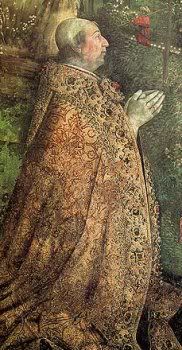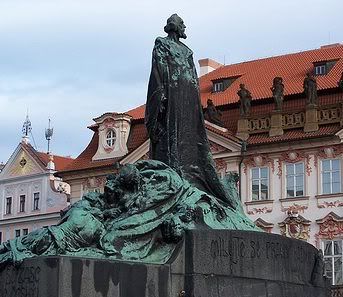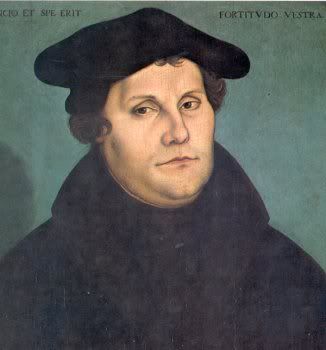The Protestant Reformation
"Arise, O Lord, and judge your own cause. Remember your reproaches to those who are filled with foolishness all through the day. Listen to our prayers, for foxes have arisen seeking to destroy the vineyard whose winepress you alone have trod. When you were about to ascend to your Father, you committed the care, rule, and administration of the vineyard, an image of the triumphant church, to Peter, as the head and your vicar and his successors. The wild boar from the forest seeks to destroy it and every wild beast feeds upon it."
Pope Leo X, Exsurge Domine
Background
The causes of the rapid break of much of Europe from the authority of the Roman Catholic Church are varied, and stretch deep into the Middle Ages. To an extent the Papacy brought it on itself, with a series of bad popes including the ambitious Alexander V, who used his illegitimate son Cesare Borgia, the Duke of Romagna to destroy the power of the King of Italy.
Rodrigo Borgia, or Pope Alexander V
Before this, however, there was an on-and-off movement in certain parts of Europe. There has never been perfect agreement amongst theologians about many matters of Biblical interpretation, but for most of the time these remained just that, disagreements between theologians. It was only until the late 14th century that two men spread it out into the wider populace.
These two were the Englishman John Wyclif and the Bohemian Jan Husinecky. Both were examples of the position known as Laicity, the belief that clergy should not have any authority in worldly affairs.* The former was active by the 1360s, and soon afterward he found a receptive audience in King Dewi. Wyclif still allowed for considerable royal authority, which would only be strengthened by a concurrent loss of clerical authority. England nearly fell into heresy, but Dewi was too busy fighting in France to make anything official. Wyclif died in 1384, still not officially denounced. Although Maelgwn himself stayed true to the Church, he made sure that the Lollards (as Wyclif's followers were often known) were not persecuted, a vital part of the later spread of Protestantism in England.
Husinecky, on the other hand, became a controversial figure from the start of his preaching. Influenced by the appearance of Lollard thought in Prague, Husinecky became the main leader of that group on the Continent. Husinecky was more concerned with ridding the church of various moral errors than anything else, but the confused nature of the Holy Roman Empire at the time meant that any new voice could cause considerable instability. Finally, Holy Roman Emperor Dietrich II offered him safe passage to a plenary synod of the bishops of the Empire at Constance in 1415. It was a trap, however; Husinecky was arrested, tried, and burned at the stake on July 6. This would lead Bohemia into the destructive Hussite Wars of the next twenty years.
Memorial to Jan Husinecky at the town center of Prague.
All of this found its way into the intellectual discussion of Europe, but remained under the surface for a century. It was not until 1517 that it would explode with full force, sparked by an action of Pope Leo X. In order to help pay for the new Basilica of St. Peter, Leo allowed a Dominican friar named Johann Tetzel to sell indulgences in the German region of Saxony.
Martin Luther
Martin Luther, by Lucas Cranach the Elder (1530s)
There, Tetzel found himself opposed by a theologian named Martin Luther. The son of a copper mine owner, Luther had become a monk in 1505. He became incredibly concerned for the fate of his soul, a concern only alleviated as he studied to be a doctor of theology. His great breakthrough was developing the concept of justification through faith alone, which conflicted with the Church teaching that justification was through pious acts.
It was this belief that caused him conflict with Tetzel. The idea that a person could be saved by giving money to the church was completely opposite to his own beliefs, and he stated such on 31 October 1517. This was done in the usual manner for the University of Wittenberg where Luther was teaching, by placing the document on the doors of the church there. He also sent them to the Archbishop of Mainz and to the Pope. The document was not too incredibly revolutionary, but it criticised the church enough to lead to trouble.
This trouble grew over the next few years, and soon became entangled in German politics. When HRE Erich von Muenster called an Imperial Diet at Worms in 1521, Luther was asked to recant his sayings. Instead, he refused to go back on them, and with the support of the powerful King of Baden - still sore after his family had lost the Imperial title - was hidden in Wartburg Castle in Thueringen. Around the King of Baden, several other German rulers began converting, and the populace of the country followed
en masse.
Religion in Europe, 1569

(click for full size)
__________
*These positions are different from anti-Clericalism in that they still emphasise the importance of religion in government, just not the clergy.






